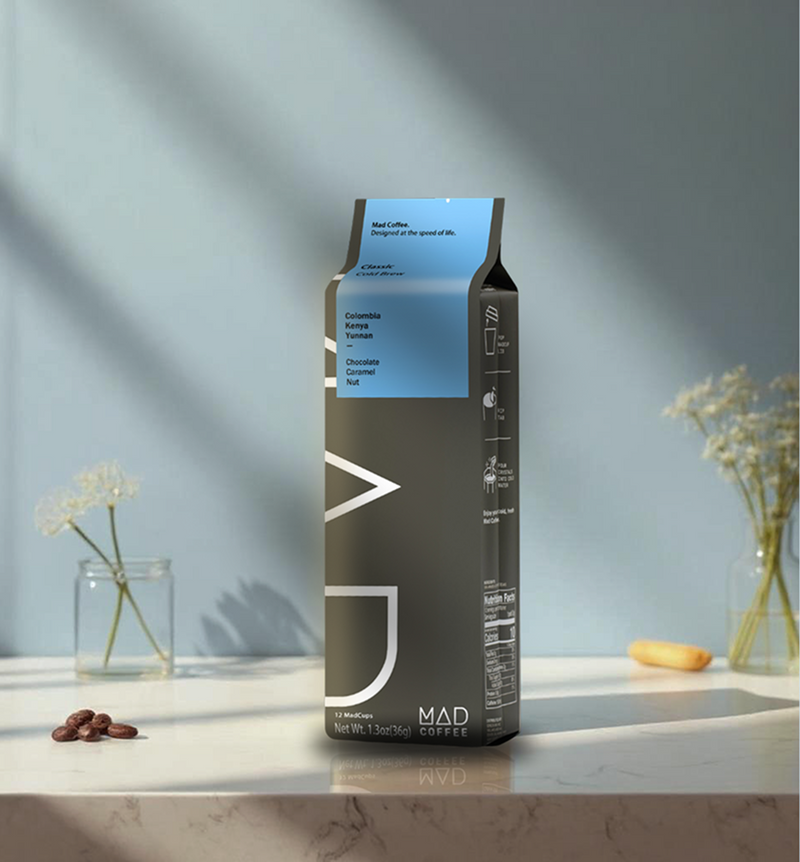Is Instant Coffee Bad for You? Exploring Health Effects and Benefits

Health Effects of Instant Coffee and How it Compares to Brewed Coffee
Maybe you’re curious about what exactly instant coffee is. Maybe you’ve been drinking instant coffee for years, but just found out it contains something called acrylamide (and now you're spiraling on Google). Or maybe you’re trying to decide whether it’s actually bad for you.
Wherever you’re coming from, this article has you covered. We’re diving deep into the world of instant coffee: what it is, how it’s made, what nutrients it offers, and how it stacks up to regular coffee in both flavor and function.
So, is instant coffee bad for you? (Spoiler alert: it's not just emergency fuel anymore. In fact, depending on how it's made, instant coffee can actually be good: for your schedule and your health!)
What You’ll Learn in This Article:
-
Instant coffee is real coffee. It’s brewed and then dried, but it still packs nutrients, antioxidants, and many associated health benefits.
-
It’s not all sunshine: instant coffee may contain more acrylamide than brewed, and some mixes include added sugars or artificial ingredients. Plus, most studies about the benefits of coffee do not focus specifically on instant coffee.
-
Choose wisely and drink instant coffee in moderation. Quality matters (freeze-dried beats spray-dried; blends vs single-origin), and its effects on your health depend on how much coffee you drink.
-
The right instant coffee can be a game-changer, especially if it's from a brand like Mad Coffee that guarantees flavor and ethical sourcing.
What Is Instant Coffee?
Instant coffee is exactly what it sounds like: real coffee, brewed strong, then turned into a powder that dissolves in water. It’s usually made by either spray-drying (spraying the dried coffee extract into hot air) or freeze-drying (freezing the liquid and removing ice under vacuum), both of which have the water removed from the coffee.
The result is a dry coffee “soluble” that instantly rehydrates in hot water. How to prepare it? Nothing easier: simply stir a teaspoon of instant coffee into hot water!
A quick bit of trivia: while the version we know today was patented in 1890 in New Zealand by David Strang, the word goes that an early attempt existed during the American Civil War. Soldiers were given a mix of coffee, milk, and sugar called “Essence of Coffee, ”and they hated it. Fortunately, the real deal caught on later. Today, instant coffee is one of the most consumed beverages worldwide, and for good reason.
Instant Coffee: Nutrient and Antioxidant Content
Instant coffee is rich in antioxidants and micronutrients, much like regular coffee. In fact, coffee is one of the most important sources of dietary antioxidants! As such, among the antioxidants found in instant coffee are:
-
Chlorogenic acids
-
Phenolics
-
Melanoidins
-
Flavonoids
According to Niseteo et al., instant coffee actually contains the highest values of certain antioxidants, such as phenols and chlorogenic acid derivatives!
In terms of nutrients, instant coffee is a good source of:
-
Potassium
-
Magnesium
-
Niacin
-
Biotin
-
Manganese
So, drink coffee! Have two cups of instant coffee a day and you’ll get a little nutritional boost, without even trying!
Positive Health Effects of Instant Coffee
Spoiler alert: your daily cup of instant coffee might be doing more than just keeping you awake!
Sure, it’s convenient. But instant coffee actually shares many of the same health perks as regular coffee. It all starts with caffeine and antioxidants: the power duo behind coffee’s feel-good effects.
Here’s what science says instant coffee might do for you:
-
Boost brain function. The caffeine in instant coffee can affect your nervous system. It can improve alertness, concentration, and overall cognitive performance in the short term.
-
Boost metabolism and fat burning. Caffeine is known to modestly increase metabolic rate and help the body burn fat for energy. Studies also show that caffeine consumption leads to improvements in physical endurance.
-
Improve liver health. Coffee has protective effects on the liver, lowering the risk of liver disease. Consuming coffee is linked to a reduced risk of liver cirrhosis and liver cancer. The antioxidants and caffeine may help reduce inflammation and fibrosis in the liver.
-
Lower the risk of developing chronic diseases. Habitual coffee intake is strongly correlated with a lower risk of several chronic diseases. For example, coffee drinkers have a lower incidence of neurodegenerative diseases like Alzheimer’s and Parkinson’s. On the other hand, some studies have shown that drinking more than 6 cups of instant coffee a day can be linked to a higher risk of dementia.
-
Improve mental health. Regular coffee consumption is associated with a lower risk of depression. Instant coffee also contains caffeine, which can improve mood and may have mild antidepressant effects.
-
Support a longer life. Some large studies find that coffee drinkers tend to live longer on average than non-drinkers. While genetics and lifestyle factors in, coffee’s healthful compounds (present in instant as well) may promote longevity. A study shows that this may be linked to the antiinflammatory properties of coffee, which potentially lower the risk of cardiovascular or other inflammatory diseases.
However, it’s not all roses. Despite the multiple benefits of coffee and, implicitly, instant coffee, it is worth noting that instant coffee may also have negative effects on your health.
Acrylamide Content in Instant Coffee
Instant coffee tends to have higher acrylamide levels than regular coffee, which is not exactly a good thing. But wait, what’s acrylamide?
Acrylamide is a chemical that forms in roasted or heated starchy foods (and coffee beans), primarily because of the high temperatures involved in producing them. It is considered a potential carcinogen at high doses - but your morning cup probably won’t come close to those levels.
A study found that the highest mean acrylamide concentrations were discovered in coffee substitutes with 818 pg/kg, followed by instant coffee with 358 microg/kg, and then roasted coffee with 179 microg/kg. This means that instant coffee has twice as much acrylamide as roasted coffee. This is linked to the extra drying steps that expose the coffee to more heat, which increases acrylamide content.
Sounds scary, we know. But here’s the deal: the actual amount of acrylamide in one cup is quite low. According to the World Cancer Research Fund, the levels we consume on an everyday basis are probably too low to pose serious health risks.
If anything, coffee has been linked to a lot of benefits that outweigh the risks associated with its acrylamide content - unless you’re drinking an enormous amount of coffee per day with nothing but sugar cookies!
Moreover, acrylamide is also found in foods like chips and crisps, so it’s impossible to completely avoid it. But if you want to play it extra safe, you can rotate between instant coffee and brewed coffee, which has less acrylamide.
Keep in mind that if you have any questions about coffee, its acrylamide content, and the effects it has on your body, you should talk to a healthcare professional.
Is Instant Coffee Unhealthy? Other Health Risks Associated with It
Besides the high acrylamide content, there are other health risks associated with instant coffee, including:
-
Caffeine side effects. Even though it has slightly less caffeine than regular brewed coffee, instant coffee still contains a stimulant. Excess intake can cause symptoms in sensitive people: jitteriness, anxiety, restlessness, heart palpitations, headaches, or digestive upset. High doses (especially over 400–500 mg daily) may disrupt sleep or blood pressure. Most healthy adults can consume a few cups of instant coffee without issues, but those with caffeine sensitivity, insomnia, or certain heart conditions should limit intake or switch to decaf.
-
Increased risk of type 2 diabetes mellitus. Although ground coffee is believed to decrease diabetes risk, a recent study has shown that instant coffee is actually linked to an increased risk of type 2 diabetes mellitus and related health problems.
-
Added ingredients. Watch out for flavored instant coffees and mixes. Some instant packets (especially cappuccino or flavored latte mixes) contain added sugars, artificial flavors, preservatives, or creamers with saturated fat. These additives raise calories and can contribute to weight gain or heart issues if consumed frequently. Pure instant coffee (just coffee) has virtually no calories. Only the “instant mixes” with sugar or fat add unwanted nutrients. Always check the label on instant coffee blends.
-
Acidity and stomach issues. Coffee is naturally acidic and can irritate the stomach lining or cause acid reflux in some people. Instant coffee is often considered more acidic than regular coffee. Those with gastritis or ulcers may find any coffee (instant or brewed) aggravating, so it’s recommended to drink it in moderation or seek medical advice.
-
Kidney stones. Instant coffee contains slightly more oxalic acid (oxalate) than brewed coffee. Oxalate can increase the risk of developing kidney stones. People prone to kidney stones should drink brewed coffee (which has less oxalate) or limit overall coffee consumption. For most people, however, this is a minor issue, and staying hydrated helps mitigate it.
-
Vision (recent study): A new 2025 study found a curious link between instant coffee and age-related macular degeneration (AMD) in a specific genetic group. This is an emerging finding and doesn’t prove instant coffee causes vision problems; it could be a coincidence or related to other lifestyle factors. Still, it’s something researchers are looking into.
Caffeine Content in Instant Coffee
According to the USDA, there is approximately 28.3 mg of caffeine in each teaspoon of instant coffee, which is about 0.9 g. Given that instant coffee is typically prepared with two teaspoons of instant coffee (1.8 g) added to about 200 ml of hot water, the total amount of caffeine adds up to roughly 56.6 mg of caffeine. On the other hand, a study shows that a standard cup of instant coffee has 80 mg of caffeine, compared to ground coffee, which has roughly 100 mg of caffeine.
Even though these numbers differ, one thing is clear: instant coffee does contain less caffeine than regular coffee. Still, too much caffeine, from any coffee, can cause side effects like jitteriness, sleep disturbance, or fast heartbeat.
Instant Coffee vs Brewed Coffee
While both instant and brewed ground coffee come from the same coffee beans, there are a few key differences in how they perform when it comes to flavor, nutritional values, and convenience. Here’s a side-by-side comparison to help you decide which one suits your daily brew best:
|
Feature |
Instant Coffee |
Brewed Coffee |
|
Preparation |
Just add hot water, ready in seconds |
Requires equipment (e.g., drip, French press, espresso coffee maker etc., depending on brewing method) |
|
Flavor |
Milder, slightly flatter flavor |
Richer, fresher, more complex taste |
|
Caffeine |
~50–90 mg per cup |
~70–140 mg per cup |
|
Antioxidants |
Similar |
Similar |
|
Acrylamide |
Higher because of processing (especially spray-dried) |
Lower than instant |
|
Shelf Life |
Very long shelf life; great for travel and emergencies |
Shorter; loses freshness after opening |
|
Convenience |
Ultra-convenient; no cleanup |
More time and cleanup required |
|
Cost per Cup |
Generally cheaper; no equipment required |
Slightly higher (beans, gear, filters, etc.); equipment required |
|
Additives (in mixes) |
Often includes sugar, flavors, or creamers |
Typically plain; add what you like |
In a Nutshell: Is Instant Coffee Bad for You?
So, should you drink instant coffee, or should you throw it away? Here’s a summary of what we discussed in this article, so you can decide for yourself.
Why Instant Coffee May Be Good for You
-
Antioxidant-rich: contains chlorogenic acids, polyphenols, and other compounds that fight inflammation and oxidative stress.
-
Contains nutrients: offers small amounts of potassium, magnesium, niacin, and manganese.
-
May boost brain function: thanks to caffeine, it can improve mental clarity, focus, and alertness.
-
Supports metabolism: caffeine may help increase energy expenditure and fat oxidation.
-
Liver protection: linked to lower risks of liver conditions like cirrhosis and liver cancer.
-
Potential longevity benefits: some large studies associate coffee consumption with a longer lifespan.
-
Ultra-convenient: requires no equipment, filters, or cleanup.
However, keep in mind that most of the studies pinpointing these benefits focus on coffee in general. There aren’t enough studies to confirm that these benefits apply to instant coffee as well.
Health Concerns to Keep in Mind
-
Acrylamide content: instant coffee contains more acrylamide than brewed coffee.
-
Caffeine sensitivity: can still cause jitteriness, insomnia, or digestive issues.
-
Potential link to type 2 diabetes: some studies show an association between high instant coffee intake and increased diabetes risk, though more research is needed.
-
Hidden additives: flavored or “3-in-1” instant mixes can be high in sugar, creamers, or artificial ingredients.
-
Acidity and stomach issues: can trigger reflux or upset stomach in some people.
-
Kidney stone risk: contains slightly more oxalate, which may increase risk in those predisposed.
-
Poorly studied: future research is required to fully confirm the benefits/health concerns associated with instant coffee.
Don’t Compromise: Choose MadCups for Premium Coffee
Yes, instant coffee can be rich in antioxidants and nutrients, but only if it’s made right. That’s why Mad Coffee doesn’t cut corners. Instead of using high-heat spray-drying, which can degrade antioxidant levels and produce coffee that retains only 15-20% of the volatile aromatic compounds, Mad Coffee uses a freeze-crystallization process that retains the full complexity and the many health benefits of fresh-brewed coffee.
Our MadCups:
-
Are 100% compostable
-
Contain 100% Arabica coffee
-
Have no additives or fillers
-
Are free of microplastics
-
Have been lab-tested for purity
-
Are Direct Trade sourced
Furthermore, it takes only 3 seconds to prepare your coffee with MadCups! Just pour some water into a glass, pop the lid of a MadCup, rip the tab, pour the coffee into the water, stir, and that’s it!
It’s like someone in a beret made it for you. Or better yet, like you took a detour through Italy, minus the jet lag.
FAQs
How unhealthy is instant coffee?
Instant coffee isn’t inherently unhealthy. On the contrary, it contains antioxidants and nutrients similar to brewed coffee. The concerns usually come from additives in flavored mixes and its slightly higher acrylamide content, which is still considered low-risk at typical consumption levels. However, future studies focused specifically on instant coffee are required to fully confirm its benefits/health concerns.
Why do coffee lovers hate instant coffee?
Coffee lovers may hate instant coffee because traditional instant coffee often lacks the depth, aroma, and complexity of freshly brewed coffee beans. But newer, freeze-dried instant coffees like MadCups are changing the game and turning skeptics into believers.
What is the healthiest coffee to drink?
The healthiest coffee is black coffee made from high-quality coffee beans: no sugar, no cream, just pure antioxidants and caffeine. Brewed or instant, the key is how it’s sourced, roasted, and prepared (and how much you drink).
Is regular coffee better for you than instant coffee?
Brewed coffee typically has a bit more antioxidants and slightly less acrylamide than instant, giving it a slight edge nutritionally. That said, high-quality instant coffee still offers plenty of health perks, plus unbeatable convenience. Either way, the key to reaping the benefits of coffee is to consume it in moderation.
Does instant coffee have less caffeine than regular brewed coffee?
Yes, instant coffee usually has less caffeine than regular brewed coffee because it is extracted at higher temperatures and pressures.












